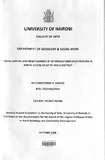Social capital and ressettlement of internally displaced persons in Kenya: a case study of Molo District
| dc.contributor.author | Kiboro, Christopher N | |
| dc.date.accessioned | 2012-11-13T12:35:26Z | |
| dc.date.available | 2012-11-13T12:35:26Z | |
| dc.date.issued | 2009 | |
| dc.identifier.uri | http://erepository.uonbi.ac.ke:8080/handle/123456789/5110 | |
| dc.description.abstract | This study used primary data from Molo district to investigate the role and significance of social capital in the resettlement of IDPs in Kenya. The general practice in the formulation of development policy in Kenya has often failed to take into account all the basic national resources, particularly social capital. The main focus has been on the development of other types of capital with the view to enhancing economic growth while ignoring the various dimensions of social capital and how these dimensions affect development and social welfare in general. Descriptive methods were used to achieve the objectives of the study. Results from the descriptive analysis show that the role of social capital is very significant in the resettlement of the IDPs. There is evidence in the study area that social capital facilitated the resettlement of the internally displaced persons more particularly through social groups and networks. The findings further show the determinants of social capital as well as the dominant forms of social capital in the study area. The findings of the study suggest recommendations that are expected to yield increased stocks of social capital in the country and in particular the war-wounded communities. The findings can further be used to guide the reconciliation process as well as promoting social cohesion in the country. | en_US |
| dc.language.iso | en_US | en_US |
| dc.publisher | University of Nairobi, Kenya | en_US |
| dc.title | Social capital and ressettlement of internally displaced persons in Kenya: a case study of Molo District | en_US |
| dc.title.alternative | Thesis (MA) | en_US |
| dc.type | Thesis | en_US |

